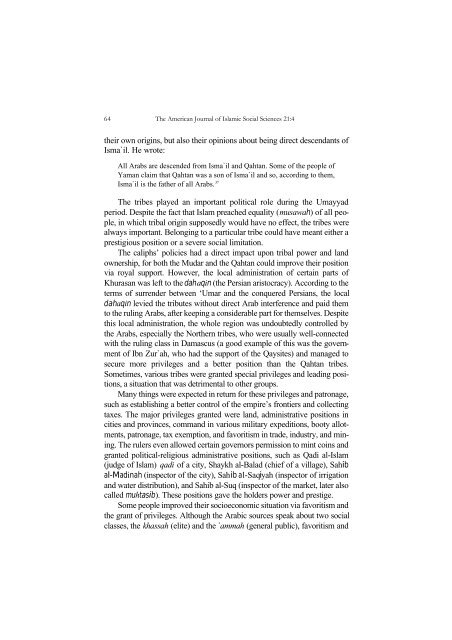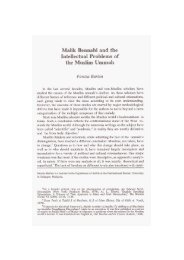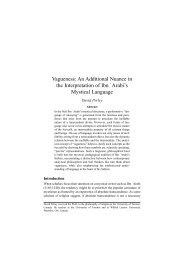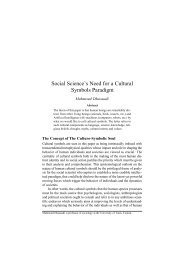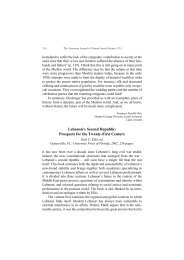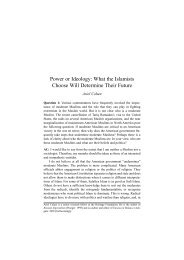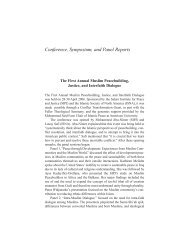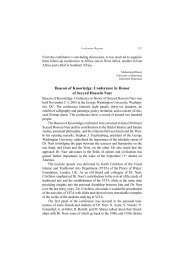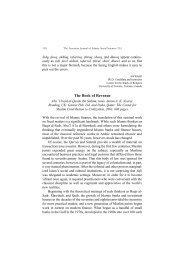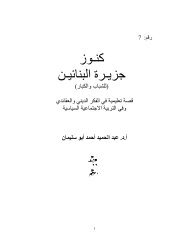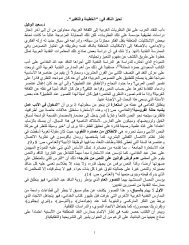Arab Tribes, the Umayyad Dynasty, and the `Abbasid ... - Epistemology
Arab Tribes, the Umayyad Dynasty, and the `Abbasid ... - Epistemology
Arab Tribes, the Umayyad Dynasty, and the `Abbasid ... - Epistemology
You also want an ePaper? Increase the reach of your titles
YUMPU automatically turns print PDFs into web optimized ePapers that Google loves.
64 The American Journal of Islamic Social Sciences 21:4<br />
<strong>the</strong>ir own origins, but also <strong>the</strong>ir opinions about being direct descendants of<br />
Isma`il. He wrote:<br />
All <strong>Arab</strong>s are descended from Isma`il <strong>and</strong> Qahtan. Some of <strong>the</strong> people of<br />
Yaman claim that Qahtan was a son of Isma`il <strong>and</strong> so, according to <strong>the</strong>m,<br />
Isma`il is <strong>the</strong> fa<strong>the</strong>r of all <strong>Arab</strong>s. 37<br />
The tribes played an important political role during <strong>the</strong> <strong>Umayyad</strong><br />
period. Despite <strong>the</strong> fact that Islam preached equality (musawah) of all people,<br />
in which tribal origin supposedly would have no effect, <strong>the</strong> tribes were<br />
always important. Belonging to a particular tribe could have meant ei<strong>the</strong>r a<br />
prestigious position or a severe social limitation.<br />
The caliphs’ policies had a direct impact upon tribal power <strong>and</strong> l<strong>and</strong><br />
ownership, for both <strong>the</strong> Mudar <strong>and</strong> <strong>the</strong> Qahtan could improve <strong>the</strong>ir position<br />
via royal support. However, <strong>the</strong> local administration of certain parts of<br />
Khurasan was left to <strong>the</strong> dahaqin (<strong>the</strong> Persian aristocracy). According to <strong>the</strong><br />
terms of surrender between ‘Umar <strong>and</strong> <strong>the</strong> conquered Persians, <strong>the</strong> local<br />
dahaqin levied <strong>the</strong> tributes without direct <strong>Arab</strong> interference <strong>and</strong> paid <strong>the</strong>m<br />
to <strong>the</strong> ruling <strong>Arab</strong>s, after keeping a considerable part for <strong>the</strong>mselves. Despite<br />
this local administration, <strong>the</strong> whole region was undoubtedly controlled by<br />
<strong>the</strong> <strong>Arab</strong>s, especially <strong>the</strong> Nor<strong>the</strong>rn tribes, who were usually well-connected<br />
with <strong>the</strong> ruling class in Damascus (a good example of this was <strong>the</strong> government<br />
of Ibn Zur`ah, who had <strong>the</strong> support of <strong>the</strong> Qaysites) <strong>and</strong> managed to<br />
secure more privileges <strong>and</strong> a better position than <strong>the</strong> Qahtan tribes.<br />
Sometimes, various tribes were granted special privileges <strong>and</strong> leading positions,<br />
a situation that was detrimental to o<strong>the</strong>r groups.<br />
Many things were expected in return for <strong>the</strong>se privileges <strong>and</strong> patronage,<br />
such as establishing a better control of <strong>the</strong> empire’s frontiers <strong>and</strong> collecting<br />
taxes. The major privileges granted were l<strong>and</strong>, administrative positions in<br />
cities <strong>and</strong> provinces, comm<strong>and</strong> in various military expeditions, booty allotments,<br />
patronage, tax exemption, <strong>and</strong> favoritism in trade, industry, <strong>and</strong> mining.<br />
The rulers even allowed certain governors permission to mint coins <strong>and</strong><br />
granted political-religious administrative positions, such as Qadi al-Islam<br />
(judge of Islam) qadi of a city, Shaykh al-Balad (chief of a village), Sahib<br />
al-Madinah (inspector of <strong>the</strong> city), Sahib al-Saqiyah (inspector of irrigation<br />
<strong>and</strong> water distribution), <strong>and</strong> Sahib al-Suq (inspector of <strong>the</strong> market, later also<br />
called muhtasib). These positions gave <strong>the</strong> holders power <strong>and</strong> prestige.<br />
Some people improved <strong>the</strong>ir socioeconomic situation via favoritism <strong>and</strong><br />
<strong>the</strong> grant of privileges. Although <strong>the</strong> <strong>Arab</strong>ic sources speak about two social<br />
classes, <strong>the</strong> khassah (elite) <strong>and</strong> <strong>the</strong> `ammah (general public), favoritism <strong>and</strong>


